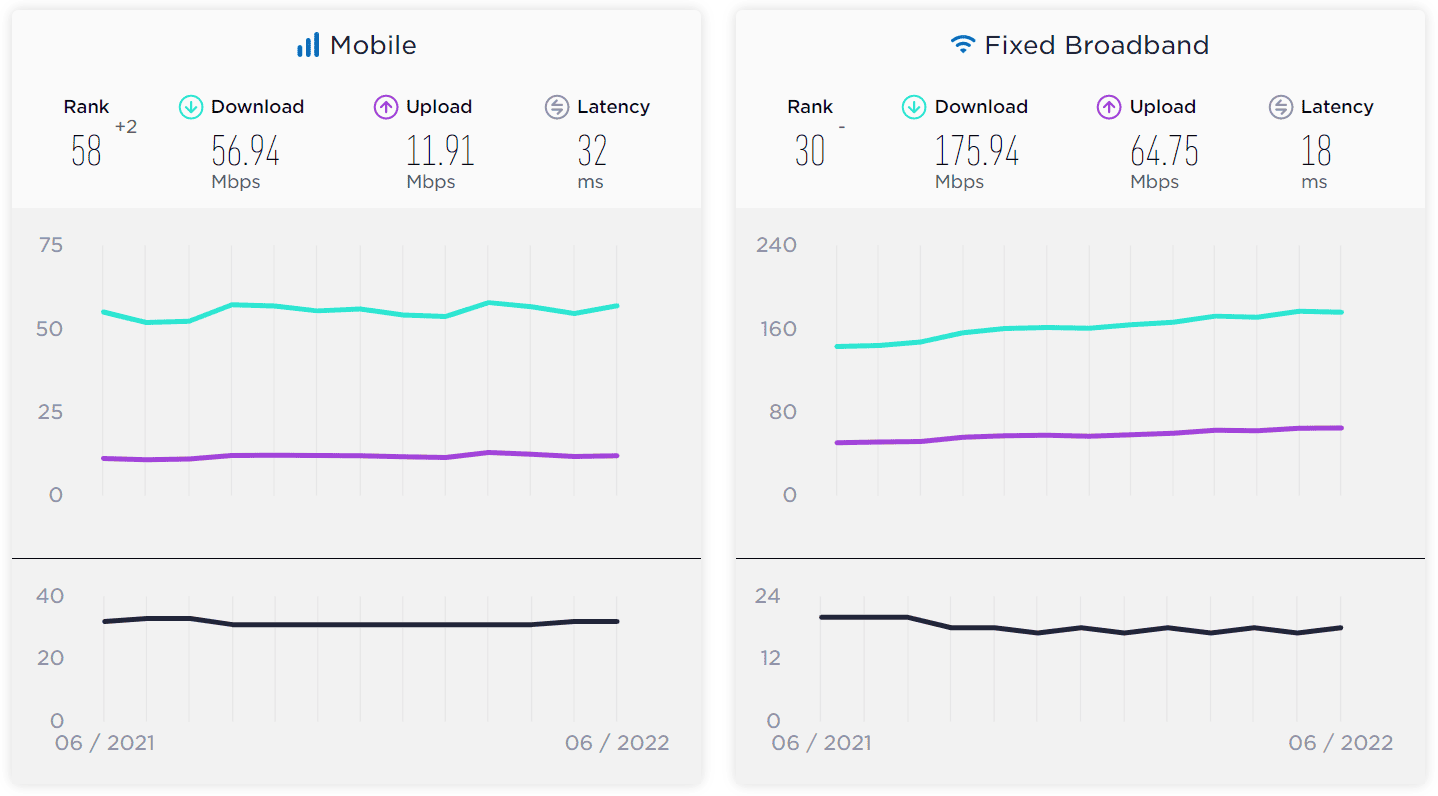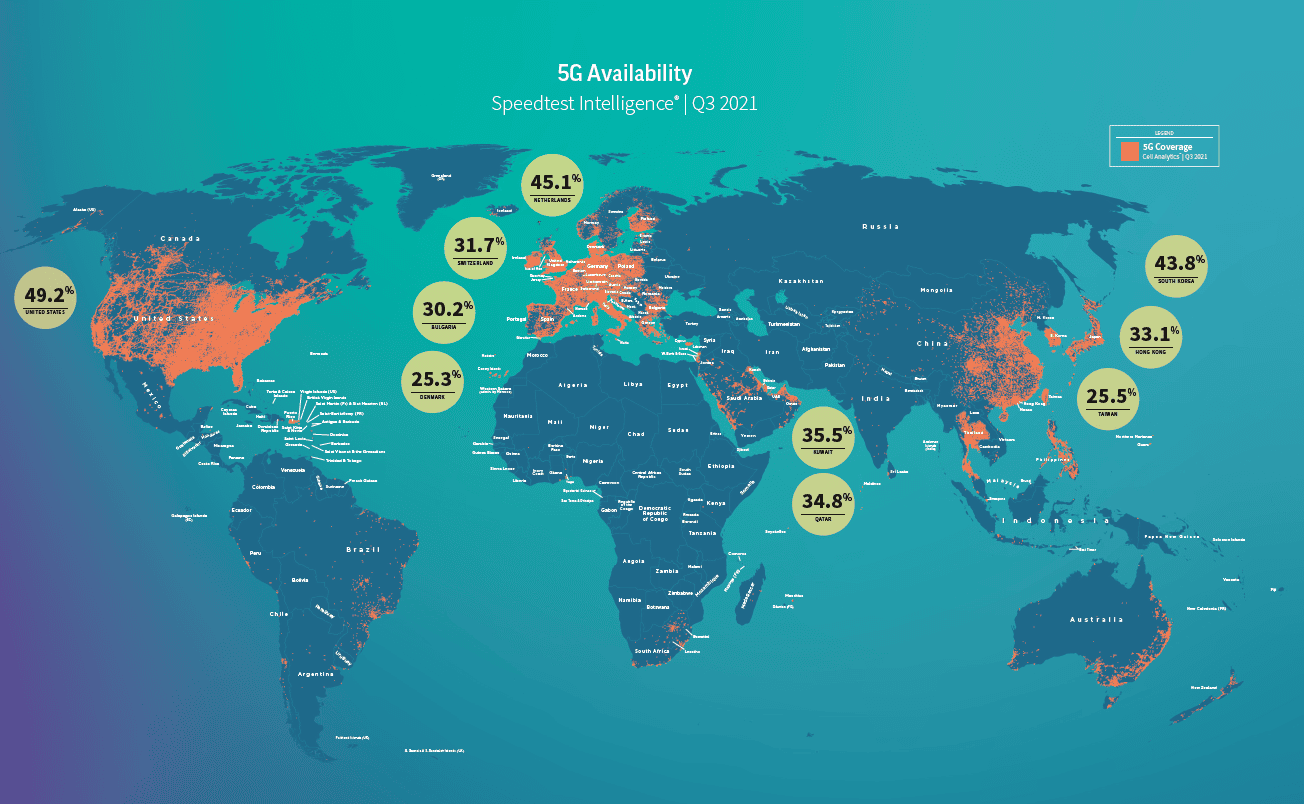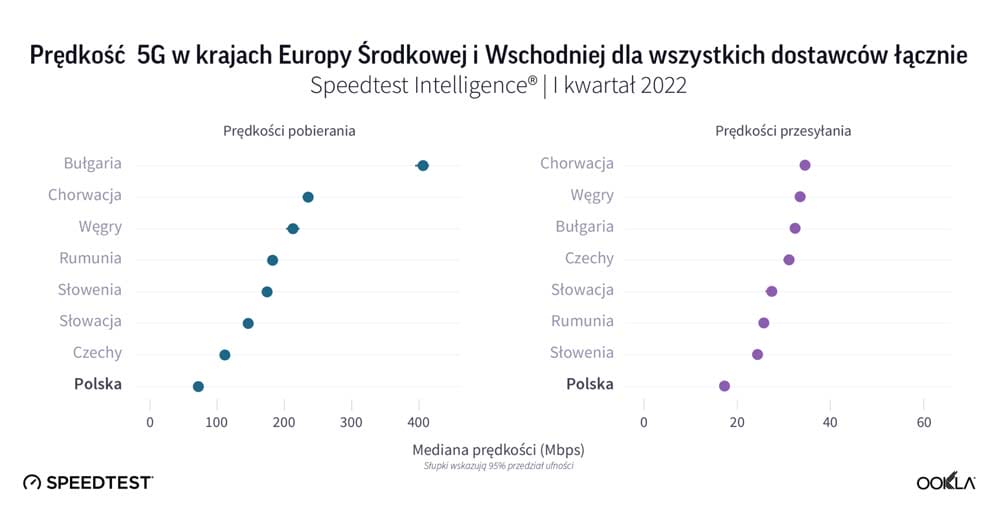Internet bandwidth in Poland, Europe and the world – how do we compare with other countries?

Kamil Skuza
Reading time: 4 min
 Date: 16 August 2022
Date: 16 August 2022So how do we compare with other countries?
Speedtest.net is a website where we can check the bandwidth of our connection, i.e. measure how fast we are able to download files, upload them (transmit) and what our ping (latency) is. While a large proportion of Internet users use such tests on a regular basis, few know that the site collects data of such measurements from all over the world, averages them and publishes them in a regularly updated report, in which it compares all countries.

To quote the supervisor of the Chernobyl nuclear power plant (moments before the explosion): ‘not great, not terrible’. In the mobile internet measurement we rank 51st (according to the median) and 58th (according to the average). In the broadband tests, on the other hand, it’s 34th (according to median) and 30th (according to average) respectively. Not bad, given that more than 100 other countries are behind us. Poor, considering that we are ahead of Chile, Bulgaria, Cyprus, Northern Macedonia, Maldives, Lithuania, Malta, Latvia, Oman, Czech Republic, Serbia, Montenegro, Iraq, or Albania.
It is comforting to note that, despite occupying distant places in the measurement of mobile internet speeds (50th and 58th), around 19 million people in Poland already have access to 5G. However, again, the stick has two ends. On the one hand, the architecture is still being expanded and improved. On the other hand, however, we have the slowest 5G internet in this part of Europe. We are ahead of Bulgaria, Croatia, Hungary, Romania, Slovenia, Slovakia and the Czech Republic, among others. It looks good on the map, but in practice there is still a lot to be done.

OK, we already know from the report that, on average, we download (on cable) at 134Mbps, upload 75Mbps, and reach 76Mbps and 14Mbps on mobile. At home, we’re probably interested in such figures when watching movies on VOD services, playing video games, listening to music or streaming. But what relevance can this have to the operation of a business? Especially in terms of data analytics?
Well, if Outlook doesn’t download a single email for more than a few seconds, Zoom/Teams doesn’t stutter and we have free access to files and the company server – then everything is probably OK. And contrary to earlier, not very reassuring statistics, most Polish companies do not complain about network problems. But what about when we need access to data and analytics? What if we want to work with data on a regular basis, rather than just reviewing a daily report? I should like to reassure you straight away that a stable connection, rather than a fast one, will suffice for such purposes.

Business Intelligence tools, such as Qlik or Altair, often require (for our security) logging in via VPN (especially if we are working outside the office) and then it is the consistent quality of the connection that is key, not the speed. We don’t need to have 100Mbps downloads. 15Mpbs (or even less) is sufficient for comfortable use of tools such as Qlik Sense or Altair Monarch. I can bet that sooner Netflix chokes loading a movie in 4K than Qlik won’t let us into its data warehouse. What’s more, if we plan to work on the data in places without internet (train, plane), there’s nothing stopping us from viewing and editing it locally (if we’ve downloaded it beforehand, of course) from any device. Both in Qlik and the Altair tools.

It may be puzzling and surprising that some countries that are less economically developed than Poland, or less populated, have faster Internet and better access to it. Further development of 5G is promising, LTE speeds are also good, and we are not at the embarrassing end of the table. But most importantly for our business – we don’t need to break speed records in connection capacity to efficiently analyse and manage data, also in real time. Which, of course, does not change the fact that it would be nice if we, as a country and its people, were more technologically advanced. On a daily basis in companies, homes and public places. Something I sincerely wish for myself and all readers.
If you want to check whether your organisation is technologically ready for the implementation of Business Intelligence tools, contact us – we will do a test and, in the process, solve one of your business problems. And all this within 5 working days.
Source:
Photos:
unsplash, ookla, speedtest
Bibliography:
https://www.speedtest.net/global-index
https://www.speedtest.net/global-index/poland#fixed
https://gsmonline.pl/artykuly/predkosc-5g-w-europie-i-polsce
https://www.ookla.com/articles/worldwide-state-5g-poster-download
https://www.ookla.com/s/media/2022/02/ookla_state-of-5g-worldwide_poster_2021.pdf
https://www.plus.pl/news/art-8601-ponad-19-milionow-czyli-wiecej-niz-polowa-mieszkancow-polski-w-zasiegu-najszybszego-internetu-5g-plus
See recent writings
You drive us to strive for excellence in delivered projects and common challenges. Feel invited to read out blog that provides more in-depth knowledge on our implementations and experience. Read articles about digital business transformation, ERP and Business Intelligence systems. Discover interesting practical applications for future technologies.
- Blog
Navigating the challenges of introducing new software in a company – the role of technology and social dynamics
Contact us!
Let’s talk! Are you interested in our solutions? Our experts are happy to answer all of your questions.
 pl
pl

















